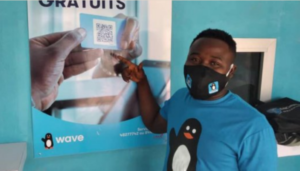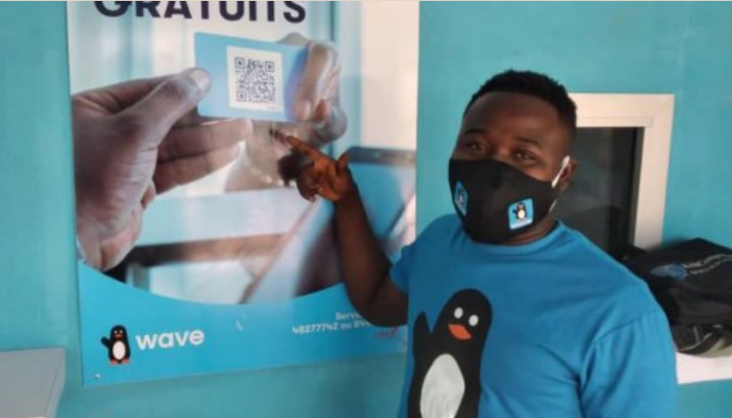
Created by two Americans to lower the cost of mobile money transactions, Wave has been in the spotlight ever since Orange tried to curb its development in Senegal.
With its eyes set on Free – Senegal’s second largest mobile network operator – Orange Senegal seems to have overlooked the threat posed by Wave within the mobile money industry.
Taken by surprise by the ultra-competitive offer that the US start-up (that specialises in low-cost transactions) has been proposing since May 2020, the telecoms leader decided at the beginning of June to block the possibility of purchasing phone credit via its mobile application and USSD code.
Commercial disagreement
“After several exchanges with the telephone operator, an agreement that would allow us to sell credit directly or through an approved wholesaler has still not been reached,” Wave said in a statement published on 5 June. The start-up also announced that the Regulatory Authority for Telecommunications and Posts (RATP) had been engaged so that “an equitable decision could be made.”
“Wave had to ask for the same commission as Orange’s normal distribution circuit but the latter refused,” said a person familiar with Senegalese telecoms.
A few hours after Wave published its statement, Orange issued a press release stating that the operator had made proposals “in line with those offered to [its] other providers.” The telecoms group believes that Wave is asking for special treatment.
1% fee
Wave was founded in 2011 by two Americans – Drew Durbin and Lincoln Quirk (both based in New York) – and was registered in Dakar in 2016. It works by applying a fixed transaction fee of 1% for payments between individuals, saving its users from additional fees on bill payments by passing them on to businesses – unlike its competitor, which charges this fee to its customers.
Using this same model, Wave’s branch in Dakar – which is led by Coura Sène, a former InTouch employee – has convinced major investors to provide funding. The French company Partech and the prestigious US incubator Y Combinator have already invested, as have Founders Fund and Serena Venture – two Californian venture capital firms. In total, the start-up, which has linked up with UBA and Ecobank to operate in Senegal, has raised $13.8m since its creation.
To match the competition, Orange decided to lower its bill payment fees to 1% on 1 June; and in an effort to compensate, levied a percentage on transactions between individuals, according to a principle of increments calculated according to the amount sent (some transactions can thus be taxed up to 10%).
The rapid and sudden drop in prices has not gone down well in Dakar. “Users feel insulted because they feel that Orange has imposed abusive charges on them for a long time,” says a Dakar entrepreneur.
A long-lasting dispute
The dispute between Wave and Orange is now in the hands of the telecoms regulator. This does not mean that the issue will be resolved quickly. “In principle, this case concerns a commercial contract for over-the-counter distribution that is not regulated, [so Wave’s approach] is surprising,” Fabrice André, Sonatel’s deputy director-general, told us.
According to Sonatel, the objective is to capitalise on the lack of regulation within the mobile money sector in Senegal.
“The RATP may well declare itself incompetent because the market that is impacted by Orange GSM’s behaviour is not the telecommunications market, but rather the mobile money industry,” says a Senegalese specialist in telecoms regulation, who is also the director of a pan-African operator. “Discrimination in itself is not a prohibited practice if it can be proven that the two entities discriminated against are not part of the same family,” he says.
But if the telecoms regulator declares itself incompetent, this complex case may be brought before the Central Bank of West African States (BCEAO), or be judged as a common law case by the Competition Authority.
“The only thing that I am certain of is that Orange Money has been seriously pushed around by Wave and is getting a helping hand from Orange GSM to try to contain the blue wave [of Wave’s commercial identity],” says our regulatory expert.
Same competition in Côte d’Ivoire?
In Côte d’Ivoire, where Wave was launched in April 2021, the Senegalese dispute is being closely monitored.
“Each country has its own distribution model. In Côte d’Ivoire’s case, we practice zoning via 14 exclusive distributors with whom we have worked for nearly 15 years. The contracts were renewed in October 2020 but Wave did not bid on any of them,” says Mamadou Bamba, Orange Côte d’Ivoire’s general manager.
Wave is still a new service in the West African country and is in the midst of a communication campaign to make itself known. On 25 May, the start-up organised a panel session in Abidjan to discuss the role of fintech in financial inclusion.
During the discussion, Daniel Ahouassa, co-founder of the online media group Weblogy (Wave’s co-founder Durbin Sène) and Bruno Belinga, the fintech’s director of operations, took the opportunity to promote their business model.


